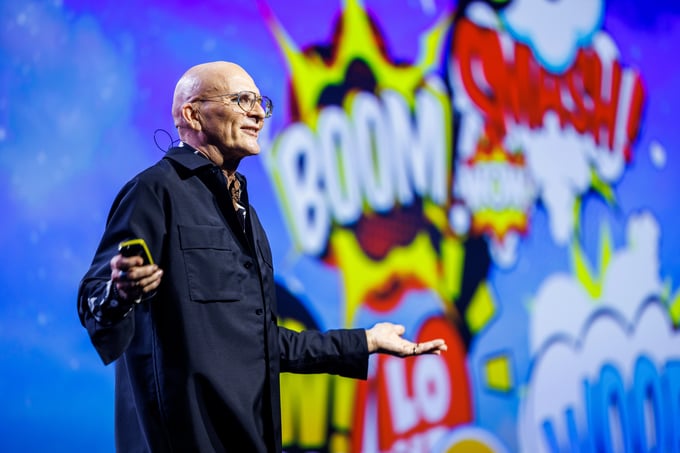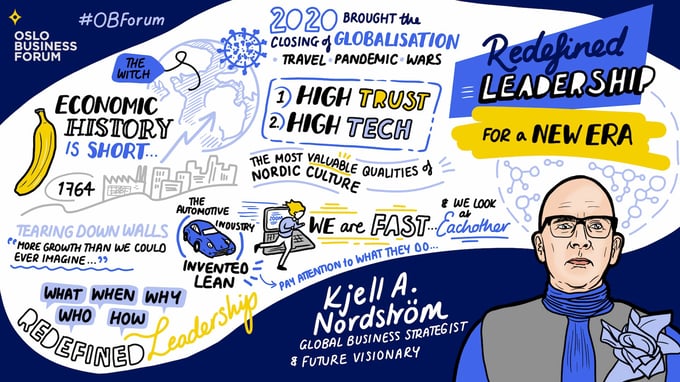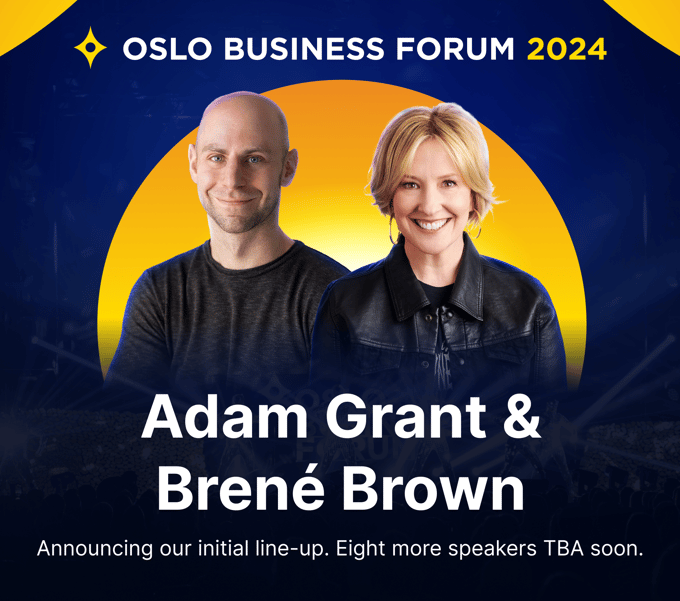In a world where change is the only constant, Kjell A. Nordström emerges as a clear voice for business leaders seeking direction. At OBF 2023, Kjell combined his knowledge with practical advice, outlining the way forward in a chaotic global economy.
Our globalized economy has been radically disrupted by change and uncertainty. It began with a virus, the first global pandemic in more than 100 years. It revealed weaknesses in the value chain. Then, Russian tanks rolled into Ukraine, inciting the first war in almost 80 years. In the background, a lingering climate crisis was raising its voice a bit louder every day.
The pandemic, the war, CO2, and even smart machines have created chaos in the world and in our economies. Usually, these economic shocks come one or two at a time. We are under immense pressure with four of them now.
High Tech, High Trust
Amid the chaos, however, Kjell pointed out that Nordic Countries are the winners. The Nordic Countries lost less than 3 percent of their GDP during these crises, while Europe lost 9 percent on average, and some countries lost as much as 25 percent.
The Nordic Countries have been outperforming for 70 years when it comes to welfare, innovation, growth, and more. What’s the trick? As Kjell sees it, it is simple: “High tech, high trust.”
“We trust each other in our societies, the government, municipalities, schools, neighbors,” he said. “Combine this with high tech and get [things] done fast.”
Leadership, Redefined
The combination of high tech and high trust is the definition of a dynamic environment. It turns out that you can get things done very fast when you’re afraid, and that is the condition many of us have worked in during the past three years.
Consider your own organization’s shift to virtual work during the pandemic. Hybrid work redefined leadership, and it was the biggest transformation of human industrial activity since industry began.
Work was once something that we did at a particular place and at a particular time. It was automatic. As humans, we self-coordinate, looking to each other for our behavioral cues. Kjell likens us to starlings who fly together with no leader. But now, for the first time in 250 years, the starling was flying alone a few days a week. Who was going to tell him what to do?
This shift required a new type of leadership. It required leaders to become storytellers.

Kjell A. Nordström is a Swedish economist, management thinker, and best-selling author. In 2015, Kjell was ranked No. 15 out of 30 on the list of the world’s most influential management gurus.
What Happens Now?
Kjell’s work to understand “what’s next?” has led him to seek answers from some of the world’s most progressive companies. He pointed to the global automotive industry, revealing the trends auto-makers are paying attention to today—and these are the trends we must pay attention to tomorrow.
“If you want competition, nothing compares to the automotive industry,” Kjell said. “The pressure is brutal and has been for 100 years.”
Historically, the automotive industry has been ahead of pace, doing things two, five, fifteen years before the same trends pervade other sectors. They invented Lean in the 1960s. They pursued personalization in the 1980s. “What happens in that industry, the rest of us will do,” said Kjell.
Kjell offered one example of auto makers’ ability to see into the future. They have recognized that people move a lot. In fact, Americans, on average, move 30 times in their lifetime. Urbanization is ramping up, and predictions are that 80 percent of the world’s population will live in just 600 cities within the next 25 years. The automotive industry is interested in designing a logistics system that works under these circumstances.
From the shift to electric to new trends in urbanization to the rise of artificial intelligence, Kjell has seen the future and it points in one direction: we are transforming knowledge and intelligence into a service, and this is leveling the playing field.
Create the Stories
The changes shaking our world today require a new type of leadership, one that cuts through the chaos and complexity for those we lead. To create clarity, we must construct a story around our time. Kjell left leaders at Oslo Business Forum with one instruction: “Now is the time to create the stories.”
Key Points:
- Major economic shocks usually come one or two at a time. We are under immense pressure with four now: the reverberations from the pandemic, the war in Ukraine, the climate crisis, and the rise of smart machines.
- The key to the Nordic Countries’ success has been high tech and high trust.
- The automotive industry is historically ahead of pace, doing things years before the same trends pervade other sectors.
- The trends automakers are paying attention to today include electric energy, experimentation in artificial intelligence, and new trends in urbanization. These are the trends other business leaders must also pay attention to.
- The changes shaking our world today require a new type of leadership to cut through the chaos and complexity for those we lead.
- Leaders must be storytellers; now is the time to create the stories.
Questions to Consider:
- How have the global economic shocks of the last few years disrupted your business?
- Is your business typically ahead of or lagging behind global trends? What can you do to keep pace?
- If intelligence is becoming a service, what does that mean for your industry or profession?
- How are you demystifying today’s complexities for those you lead? What stories are you creating?
Want to be a part of the OBF community? Join Oslo Business Forum 2024: Courageous Leadership now!